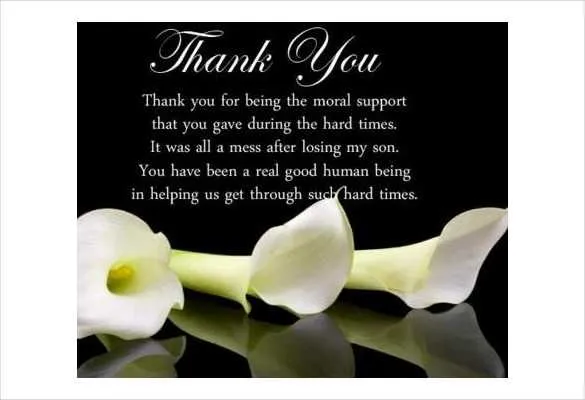Heartfelt Appreciation for Your Presence on the Death Anniversary Event

Sending a heartfelt thank you note after a death anniversary gathering is an important way to show appreciation for those who joined in remembrance. It acknowledges their presence and the support they offer during a difficult time. A well-crafted message can convey your gratitude without feeling overly formal, creating a warm and personal connection.
Make sure your message is genuine and reflects the comfort others provided simply by being there. Start with a simple, direct expression of thanks. For example, “Thank you for honoring the memory of [name] with us,” lets the recipient know their presence was meaningful. It also helps to acknowledge the shared experience, such as, “Your presence made the day easier for us all.”
If you feel compelled, add a personal touch by referencing specific moments from the gathering that were meaningful to you. A mention of a shared story, a kind word someone said, or even a gesture can enhance the sincerity of your message. Ending with a note of ongoing appreciation, such as, “We will always cherish your support,” leaves the recipient with a sense of connection long after the event is over.
Thank You Message for Attending a Death Anniversary
Express your gratitude with a thoughtful note that directly acknowledges the importance of the attendees’ presence. Start by thanking everyone for their support, such as: “Thank you for being there to honor [name]’s memory with us.” This conveys a sense of appreciation and sets a genuine tone.
It’s important to recognize the shared experience of remembering someone who has passed. A simple phrase like “Your presence truly made a difference during this meaningful time” helps acknowledge the emotional support of those who attended. Offering personal touches, such as mentioning specific conversations or memories shared during the gathering, adds sincerity to the message.
End the note on a warm, forward-looking note. Express gratitude not only for the day but for ongoing support, such as: “Your kindness continues to comfort us as we move forward.” This keeps the connection open and lets the recipient know their support is appreciated beyond just the anniversary event.
How to Express Gratitude for Attending a Death Anniversary Ceremony
Send a personalized thank-you note to express your gratitude. Acknowledge the emotional significance of their presence and mention how it helped make the ceremony more meaningful. Be specific–refer to moments shared during the service or things they did that contributed to the occasion.
Consider a handwritten letter. It offers a personal touch that shows effort and care. If you can’t do a letter, an email with heartfelt words works as well. Keep it sincere and avoid generic statements. The key is to show you appreciate their time and support.
Include a reflection on the deceased, mentioning their connection with the person. Let the recipient know how their attendance has been a comfort and how much it meant during this solemn occasion. Recognize their role in keeping the memory alive, even after the ceremony ends.
If you feel inclined, follow up with a small gesture, like a thoughtful card or even a call. This reinforces your gratitude and maintains a personal connection beyond just a one-time message.
Above all, be genuine and avoid overstating. Simple and heartfelt words can leave a lasting impression without overwhelming the recipient.
Appropriate Phrases to Use in a Thank You Message for a Death Anniversary
Express gratitude with heartfelt words that acknowledge the support and remembrance of loved ones. Consider using simple yet meaningful phrases to show appreciation. Start by saying, “Thank you for joining us in honoring [Name] on their death anniversary.” This directly conveys your thanks for their presence and respect.
Another considerate option is “Your presence today means so much to our family. We are grateful for your support and kindness during this time.” This shows recognition of the emotional impact of the event, highlighting the value of each person’s participation.
For those who shared memories or stories, “Thank you for sharing your memories of [Name]. It brings comfort to know they are remembered by so many.” This acknowledges the emotional connection and helps keep the spirit of the deceased alive.
For those who sent flowers or gifts, you can say, “We are touched by your thoughtful gesture and kind words. Thank you for thinking of us.” This shows appreciation for their contributions while also emphasizing the sentiment behind the action.
End with a statement like “We are so thankful for the love and support you have shown us. Your presence brings us comfort.” This wraps up the message with a final expression of gratitude, reinforcing the importance of their support.
When and How to Send a Thank You Message After a Death Anniversary Event
Send a thank you message within a few days after the event. A timely note shows genuine appreciation and ensures the gesture remains heartfelt, avoiding any sense of delay or disconnection.
Keep the message simple and personal. Acknowledge their presence at the event and express gratitude for the support they provided. Here’s how to approach it:
- Be Specific: Mention any specific contributions, such as prayers, flowers, or kind words. This makes the message more meaningful.
- Express Emotion: Share how their attendance or support helped you during this difficult time. Acknowledge the comfort their presence provided.
- Keep It Short: A thank you note doesn’t need to be long. Keep it sincere and to the point. A few thoughtful sentences are enough.
- Choose the Right Medium: Depending on the relationship, a handwritten note or an email might be appropriate. A handwritten message adds a personal touch, while email can be faster and just as meaningful.
Sending a thank you message shows appreciation and keeps connections strong. Don’t wait too long–sending it too late can reduce its emotional impact. Try to send it within a week, or sooner if possible.